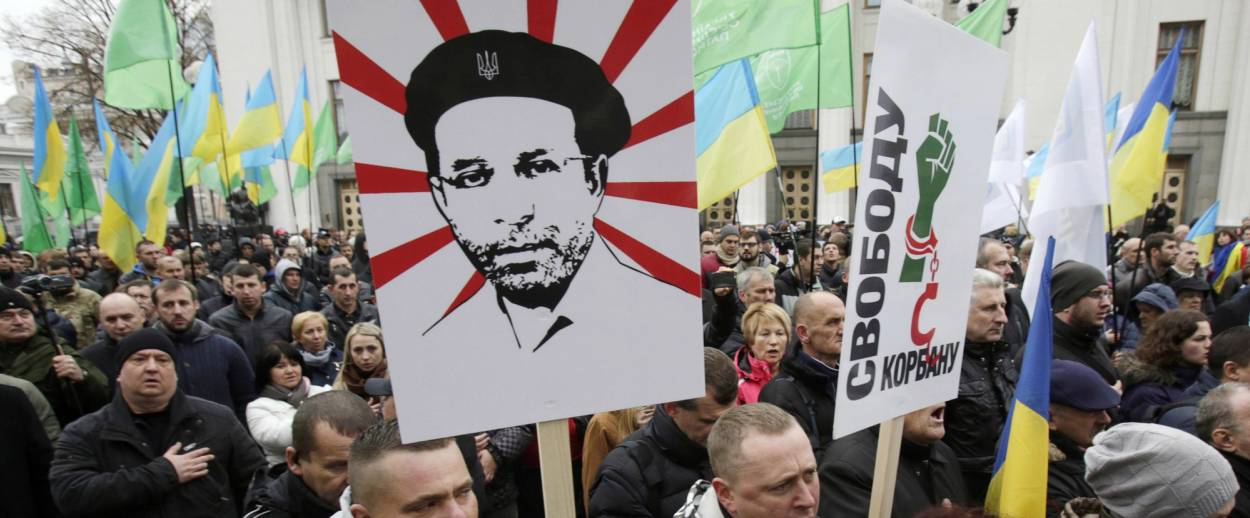UKROP Party Leader Hennadiy Korban Sentenced to House Arrest
Detainment widely viewed as a proxy conflict between Ukrainian oligarchs Ihor Kolomoisky and President Poroshenko




Hennadiy Korban, the leader of the recently formed UKROP party, a Ukrainian nationalist party at least nominally opposed to President Poroshenko, is being prosecuted on suspicion of having committed a wide range of villainous activity. Korban, a close associate and proxy for the perennially extravagant and crude oligarch Igor Kolomoisky, was detained by special forces of the SBU intelligence agency on October 31, and “was placed under suspicion for establishing a criminal organization, embezzlement, and holding a state official as a hostage,” reported Ukraine Today. (Full disclosure: I worked as the Paris correspondent for Ukraine Today, whose parent company 1+1 Media Group is partly owned by Kolomoisky.)
As he was arrested, and the government cameras rolled, Korban screamed cinematically at the masked SBU special forces squad broke into his place of residence. “What are you doing?” he yelled. “This is my home! My children are here! I defended you on the front lines! Who are you serving?” Unsurprisingly, plausible accusations of selective political prosecution have abounded with many Ukrainians wondering why others equally deserving of arrest have not therefore been apprehended. After spending a night in jail, Korban, who has a thoroughly nefarious history of criminal activity, was released only to be rearrested again on Tuesday. He has since been released once again and sentenced to two months of house arrest. In Ukraine, Korban’s arrest was so widely viewed as an intra-fratricidal proxy conflict between competing oligarchic clans—Kolomoisky and Poroshenko—that even Poroshenko’s loyal ally and speaker of Ukraine’s parliament, Volodymyr Groysman, has raised concerns in public over the arrest.
Kolomoisky was the oligarch who emerged strongest from Ukraine’s October 25 regional and local elections. Per his usual habit, Kolomoisky funded political parties on both sides of the political spectrum during this past election, with both his pro-Russian and pro-Ukrainian blocs siphoning votes off of Poroshenko’s beleaguered pro-Western governing coalition. For many Ukrainians, as well as many outside observers, Korban’s arrest looks suspiciously like a continuation of the conflict between Poroshenko and Kolomoisky that began with the latter’s ousting as governor of Dnipropitrovsk in March. Korban was also Kolomoisky’s proxy mayoral candidate in Kiev.
Ukraine’s General Prosecutor Viktor Shokin, who is bringing legal action againstKorban, was the target of an assassination attempt on Monday night in Kiev in a possible connection to the case. His office’s bulletproof glass windows blocked three bullets aimed at him. Afterwards, Ukrainian social media filled up with accusations that the attack was staged. Shokin, who was appointed by Poroshenko in February, is viewed in some Western circles as the source of discontent with Ukraine’s lack of progress in implementing corruption reforms. Rumored to be terminally ill, he is also on the cusp of the conclusion of his political life as reformist parliamentarians have gathered 120 signatures of the 150 necessary to trigger a vote for his dismissal.
The continued prosecution and conviction of Korban seems to be assured, and there should be no mistake that the accusations of selective prosecution have more than their share of truth. But it should also be pointed out that many Ukrainians think that Korban deserves to be left alone for his service in keeping the wealthy industrial hub of Dnipropitrovsk within Ukraine last spring. Pro-Russian separatists never got their hands on the region because Korban and the men he commanded held the line and brutally quelled separatist activity in Dnipropitrovsk proper. Like many others of Dnipropitrovsk’s Jewish elites, Korban has a very particular and picturesque way of combining zealous religiosity with post-Soviet banditry. He represents a continuation of Ukraine’s storied tradition of spectacular Jewish gangsters, a picturesque character who has amassed a world-class art collection.
Yet if Korban is correct in arguing that he is pivotal to ensuring the state’s sovereignty on the Eastern front, his case will also be a litmus test of the application of the rule of law to the powerful and well connected.
Previous: Ukrainian Jewish Oligarch Steps Aside, For Now
Putin Defends Ukraine’s Jews, Slams Ukraine’s Jewish Oligarchs
Related: Spurned Ukrainian Oligarch Heads to America
Vladislav Davidzon is Tablet’s European culture correspondent and a Ukrainian-American writer, translator, and critic. He is the Chief Editor of The Odessa Review and a Non-Resident Fellow at the Atlantic Council. He was born in Tashkent, Uzbekistan, and lives in Paris.